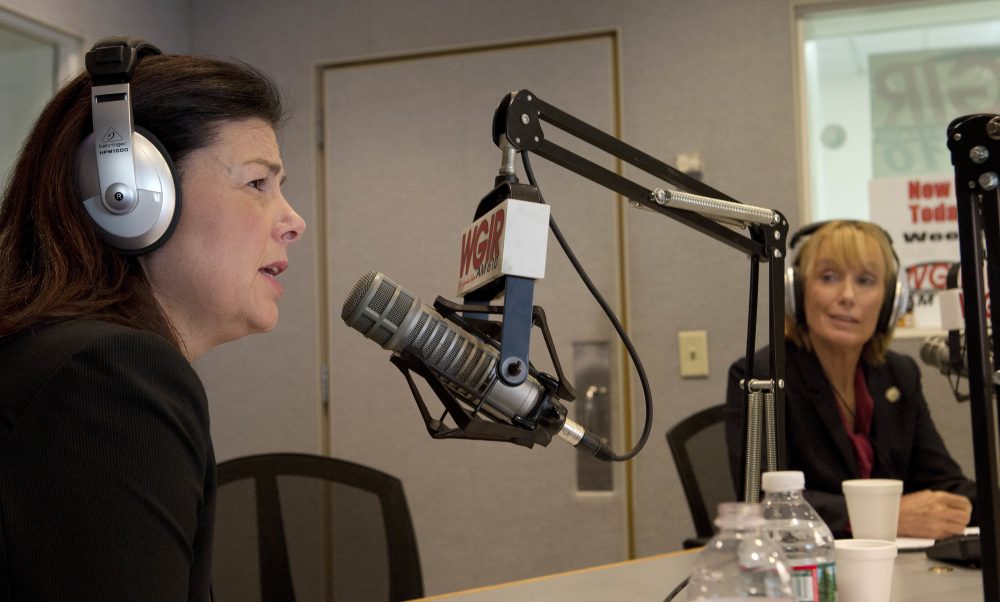Advertisement
Commentary: Democrats Are Getting Close To Retaking The Senate

As crucial as the White House is, control of the U.S. Senate will also be decided on Nov. 8 (or, as Donald Trump accidentally announced, Nov. 28).
If they win the White House, Democrats need to pick up a net of four seats to turn the trick, something odds makers at the usually reliable website FiveThirtyEight predict has a 57 percent chance of happening.
If Democrats win as expected in Illinois and Wisconsin, they would need to win three of the following seven seats: Florida, Indiana, Missouri, Nevada, New Hampshire, North Carolina and Pennsylvania.
Trump’s collapse in recent polling has come after not only the release of the “Access Hollywood” tape in which he’s heard bragging about groping and kissing women with impunity, but also almost daily revelations of persistent sexual talk and accusations of indecent assaults. But it’s not a sure bet that Republican Senate candidates will follow Trump into the graveyard. In fact, it’s quite possible that, if voters believe Hillary Clinton is going to be the next president, they may try to achieve balance by voting for a Republican for Senate to hold her in check. Some GOP Senate candidates in tough races are explicitly making that argument.
Here’s how the key races stack up:
In New Hampshire, incumbent Republican Sen. Kelly Ayotte is locked in a skin-tight battle with Democratic Gov. Maggie Hassan. It is difficult to watch TV these days in Boston without suffering through one or both of their commercials, often one after the other. In fact, it’s difficult to tell their commercials apart, since both women use images of the other in their negative spots. Despite an anomalous poll by the Boston Globe/Suffolk University showing Ayotte with a 6-point lead, a new WBUR poll shows the race deadlocked at 47 percent.
Florida’s Sen. Marco Rubio swore while running for president that he didn’t want to return to the Senate. Now running again for his seat, he has refused to denounce Trump, whom he once called “a con artist” and ridiculed for flying on “Hair Force One.” Rubio leads over Democrat Patrick McCarthy, a second-term member of Congress. McCarthy has hammered Rubio on immigration and Rubio’s peculiar allegiance to Trump, who considers Florida his second home. The Real Clear Politics average shows Rubio leading 47-42 percent, while Clinton is about 3 points ahead of Trump in the state.
In Pennsylvania, Sen. Pat Toomey has suddenly fallen behind Democratic newcomer Katie McGinty in a new poll by Bloomberg News, although the Real Clear average has the race deadlocked at 44 percent. McGinty, an aide to the governor making her first try for office, appears to be benefiting from Clinton’s rise in the state. Clinton has jumped out to a 9-point lead, boosted by a 28 percent tidal wave of support among voters in the Philadelphia suburbs in the aftermath of Trump’s “locker room" sexual assault admission. One longtime observer told me the so-called “collar counties” around Philadelphia may give Clinton as big a margin as the city itself. It’s going to be a “royal a--kicking,” he declared.
North Carolina is once again seen as crucial for both parties, but many residents are preoccupied with disastrous floodwaters left from Hurricane Matthew. First-term Republican Sen. Richard Burr, who is sticking with Trump, is being closely tracked by Deborah Ross; the latest Real Clear polling average gives the GOP incumbent a tiny 2-point edge. Ross has questioned Burr’s taking nearly 30 overseas trips worth more than $100,000 paid for by special interests. After Burr returned from Paris, Marseille, Barcelona and Madrid, he voted against a bill cracking down on special interest-funded travel. (At least he’s not a hypocrite.) Ross, a 10-year veteran of the state legislature, earned a law degree from University of North Carolina at Chapel Hill, where she also taught. She ran the American Civil Liberties Union of North Carolina, (Oh well, somebody had to do it.)
Indiana appeared to be ripe for a Democratic takeover when former Sen. Evan Bayh jumped into the race against current GOP Sen. Todd Young. However, Bayh has come under fire for taking up residence in the much-reviled Washington, D.C., where he worked as an even more reviled lobbyist after he left the Senate. His local Indiana address has been questioned by neighbors who say they never see him. Carpet-bagging charges have caused Bayh’s once-double-digit lead to slide into a 4-point advantage in the Real Clear polling average. Young, while backing Trump, has assiduously avoided saying The Donald’s name in public in hopes that Red State Indiana will vote the ticket that contains favorite son Gov. Mike Pence, whose favorable/unfavorable rating as governor wasn’t so hot — 40/46 percent in May. Handicappers now call this race a toss-up.
Illinois and Ohio look like a split decision for Democrats. Republican incumbent Mark Kirk is in deep trouble in Illinois, despite his declaring early that he could not support Trump. Sen. Rob Portman enjoys the effective backing of Ohio Gov. John Kasich, who won more than 60 percent of the vote in his last campaign. Cruising toward an easy win, Portman said he does not support Trump. Clinton is making a comeback in Ohio, but it’s not likely to stop Portman.
In Wisconsin, a new poll in the rematch between current Republican incumbent Sen. Ron Johnson and former Democratic Sen. Russ Feingold shows Feingold ahead 46-44 percent. That’s down from a 5-point lead he had in September. That same poll by Marquette University Law School showed Clinton leading Trump by 7 points. Johnson is standing by his man Trump.
Missouri was not supposed to be a problem for the GOP, but Republican Sen. Roy Blunt, 66, is in a dogfight with Democratic challenger Jason Kander, a 35-year-old military veteran and current secretary of state. Trump is underperforming in the state, but Missouri’s political leanings favor him and Blunt, a Trump loyalist. “I think the race is dead even or maybe even worse for Roy Blunt,” said Nathan Gonzales, editor and publisher of the Rothenberg & Gonzales Political Report. “Republicans should be concerned about losing the seat.”
In Nevada, where Senate Minority Leader Harry Reid is retiring, the race is closer than expected. Republican Joe Heck, who doesn’t back Trump, has a slim 3-point lead over Democrat Catherine Cortez Masto, in a state where the Latino vote is growing in clout. This may turn out to be a crap shoot, pun intended.
In Arizona, Sen. John McCain will win, perhaps narrowly, but win just the same. He is to Arizona as Ted Kennedy was to Massachusetts, beloved, flaws and all.
To sum up, I predict -- regardless of the presidential race, or perhaps because of it -- Republican candidates will win in Arizona, Florida, Indiana, North Carolina and Ohio. Democrats will take over Senate seats in Illinois, New Hampshire, Pennsylvania and Wisconsin, with Missouri and Nevada beyond the range of my political radar. Regardless, that means The Good Guys control the Senate. And confirm the next Supreme Court justice. You read it here first.
Correction: An earlier version of this post incorrectly listed Sen. Pat Toomey's first name. We regret the error.
This article was originally published on October 14, 2016.
